

List of films considered the best. Knights Templar. The Poor Fellow-Soldiers of Christ and of Solomon's temple (Latin: Pauperes commilitones Christi Templique Salomonici), commonly known as the Knights Templar, the Order of the Temple (French: Ordre du Temple or Templiers) or simply as Templars, were among the most wealthy and powerful of the Western Christian military orders[4] and were among the most prominent actors of the Christian finance.

The organization existed for nearly two centuries during the Middle Ages. The Templars' existence was tied closely to the Crusades; when the Holy Land was lost, support for the Order faded. Rumours about the Templars' secret initiation ceremony created mistrust and King Philip IV of France, deeply in debt to the Order, took advantage of the situation. Use value. Whuffie. Whuffie is the ephemeral, reputation-based currency of Cory Doctorow's science fiction novel Down and Out in the Magic Kingdom and his short story Truncat.[1] This book describes a post-scarcity economy: All the necessities (and most of the luxuries) of life are free for the taking.
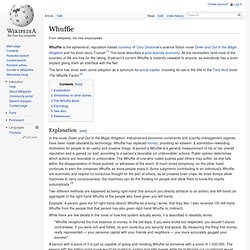
A person's current Whuffie is instantly viewable to anyone, as everybody has a brain-implant giving them an interface with the Net. The term has since seen some adoption as a synonym for social capital, including its use in the title of the Tara Hunt book The Whuffie Factor.[2] Explanation[edit] In the novel Down and Out in the Magic Kingdom, Industrial-era economic constraints and scarcity-management regimes have been made obsolete by technology: Whuffie has replaced money, providing an esteem- & admiration-rewarding motivation for people to do useful and creative things. Example: A person gave me 50 right-hand (direct) Whuffie for a song I wrote, that they like. Brownie points. Brownie points in modern usage are a hypothetical social currency, which can be acquired by doing good deeds or earning favor in the eyes of another, often one's superior. In New Zealand slang, the expression also carries the derisory connotation of having accomplished something petty or otherwise unimportant.
Gift economy. A gift economy, gift culture or gift exchange is a mode of exchange where valuables are not sold, but rather given without an explicit agreement for immediate or future rewards.[1] In contrast to a barter economy or a market economy, social norms and custom govern gift exchange, rather than an explicit exchange of goods or services for money or some other commodity.[2] According to anthropologists Maurice Bloch and Jonathan Parry, it is the unsettled relationship between market and non-market exchange that attracts the most attention.
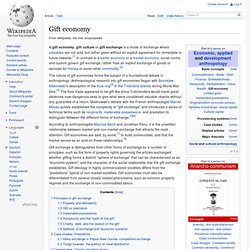
Gift economies are said, by some,[7] to build communities, and that the market serves as an acid on those relationships.[8] Principles of gift exchange[edit] Property and alienability[edit] Anarcho-syndicalism. Anarcho-syndicalism (also referred to as revolutionary syndicalism[1]) is a theory of anarchism which views revolutionary industrial unionism or syndicalism as a method for workers in capitalist society to gain control of an economy and, with that control, influence broader society.
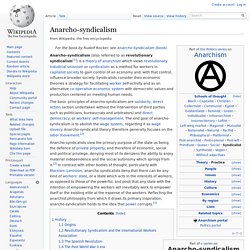
Syndicalists consider their economic theories a strategy for facilitating worker self-activity and as an alternative co-operative economic system with democratic values and production centered on meeting human needs. The basic principles of anarcho-syndicalism are solidarity, direct action (action undertaken without the intervention of third parties such as politicians, bureaucrats and arbitrators) and direct democracy, or workers' self-management. The end goal of anarcho-syndicalism is to abolish the wage system, regarding it as wage slavery. Anarcho-syndicalist theory therefore generally focuses on the labor movement.[2] History.
Libertarian socialism. Overview[edit] Libertarian socialism is a Western philosophy with diverse interpretations, though some general commonalities can be found in its many incarnations.
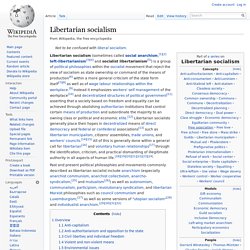
Autonomism. Autonomism or Autonomist Marxism is a set of anti-authoritarian left-wing political and social movements and theories[1][2][3] As a theoretical system, it first emerged in Italy in the 1960s from workerist (operaismo) communism.
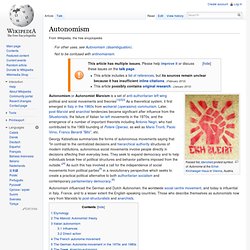
Later, post-Marxist and anarchist tendencies became significant after influence from the Situationists, the failure of Italian far-left movements in the 1970s, and the emergence of a number of important theorists including Antonio Negri, who had contributed to the 1969 founding of Potere Operaio, as well as Mario Tronti, Paolo Virno, Franco Berardi "Bifo", etc. Georgy Katsiaficas summarizes the forms of autonomous movements saying that "In contrast to the centralized decisions and hierarchical authority structures of modern institutions, autonomous social movements involve people directly in decisions affecting their everyday lives.
Etymology[edit] The Marxist Autonomist theory[edit] Gold-collar worker. Gold-collar worker (GCW) is a neologism which has been used to describe either young, low-wage workers who invest in conspicuous luxury,[1] or highly skilled knowledge workers, traditionally classified as white collar, but who have recently become essential enough to business operations as to warrant a new classification. Low wage, luxury seeking[edit] These are 18 to 25 year-old persons in a position to divert a significant portion of their earnings towards material luxuries.
They typically have fewer than 2 years of post-high school education. Like their counterparts attending college, they are often employed as retail workers or in the hospitality industry, particularly food service as servers. This group tends to have more disposable income than college students, who often pay high tuition costs, take on a number of financial loans, and often move away from their parents. Yuppie. Free love. Free love is a social movement that rejects marriage, which is seen as a form of social and financial bondage. The Free Love movement's initial goal was to separate the state from sexual matters such as marriage, birth control, and adultery. It claimed that such issues were the concern of the people involved, and no one else.[1] Many people believe marriage is an important aspect of life to "fulfil earthly human happiness.
" According to today's stereotype, earlier middle-class Americans wanted the home to be a place of stability in an uncertain world. Stoicism. School of Hellenistic Greek philosophy Stoicism is a school of Hellenistic philosophy which was founded by Zeno of Citium, in Athens, in the early 3rd century BC.
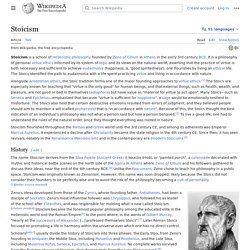
Stoicism is a philosophy of personal ethics informed by its system of logic and its views on the natural world. According to its teachings, as social beings, the path to eudaimonia (happiness) for humans is found in accepting the moment as it presents itself, by not allowing oneself to be controlled by the desire for pleasure or fear of pain, by using one's mind to understand the world and to do one's part in nature's plan, and by working together and treating others fairly and justly. Stoicism flourished throughout the Roman and Greek world until the 3rd century AD, and among its adherents was Emperor Marcus Aurelius. It experienced a decline after Christianity became the state religion in the 4th century AD. Adiaphora. Adiaphoron (plural: adiaphora from the Greek ἀδιάφορα "indifferent things") is a concept of Stoic philosophy that indicates things outside of moral law—that is, actions that morality neither mandates nor forbids.
In Christianity, adiaphora are matters not regarded as essential to faith, but nevertheless as permissible for Christians or allowed in church. What is specifically considered adiaphora depends on the specific theology in view. Wars of the Diadochi. The Wars of the Diadochi (or Wars of Alexander's Successors), (Greek: Πόλεμος των Διαδόχων, Polemos ton Diadochon) were a series of conflicts fought between Alexander the Great's generals over the rule of his vast empire, after his death. They occurred between 322 and 275 BC. Anatolia. Coordinates:

Adiaphora. Adiaphoron (plural: adiaphora from the Greek ἀδιάφορα "indifferent things") is a concept of Stoic philosophy that indicates things outside of moral law—that is, actions that morality neither mandates nor forbids. In Christianity, adiaphora are matters not regarded as essential to faith, but nevertheless as permissible for Christians or allowed in church. What is specifically considered adiaphora depends on the specific theology in view.
New Harmony, Indiana. Feed-in tariff. A feed-in tariff (FIT, standard offer contract)[1] advanced renewable tariff[2] or renewable energy payments[3] is a policy mechanism designed to accelerate investment in renewable energy technologies.
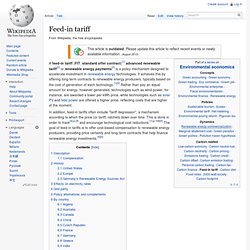
It achieves this by offering long-term contracts to renewable energy producers, typically based on the cost of generation of each technology.[1][4] Rather than pay an equal amount for energy, however generated, technologies such as wind power, for instance, are awarded a lower per-kWh price, while technologies such as solar PV and tidal power are offered a higher price, reflecting costs that are higher at the moment. WikiWin: Court orders VISA to open donation gateway or pay fines. Nepotism. Nepotism is favoritism granted in politics or business to relatives.
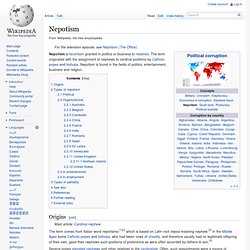
The term originated with the assignment of nephews to cardinal positions by Catholic popes and bishops. Gulf War syndrome. Suggested causes have included depleted uranium, sarin gas, smoke from burning oil wells, vaccinations, combat stress and psychological factors.[6] El mito de las ocho horas de sueño.